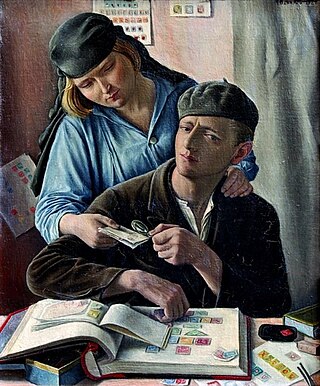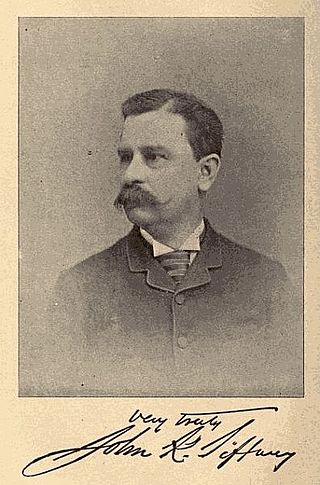
Philately is the study of postage stamps and postal history. It also refers to the collection and appreciation of stamps and other philatelic products. Philately involves more than just stamp collecting or the study of postage; it is possible to be a philatelist without owning any stamps. For instance, the stamps being studied may be very rare or reside only in museums.

A postage stamp is a small piece of paper issued by a post office, postal administration, or other authorized vendors to customers who pay postage. Then the stamp is affixed to the face or address-side of any item of mail—an envelope or other postal cover —which they wish to send. The item is then processed by the postal system, where a postmark or cancellation mark—in modern usage indicating date and point of origin of mailing—is applied to the stamp and its left and right sides to prevent its reuse. Next the item is delivered to its addressee.

Stamp collecting is the collecting of postage stamps and related objects. It is an area of philately, which is the study of stamps. It has been one of the world's most popular hobbies since the late nineteenth century with the rapid growth of the postal service, as a never-ending stream of new stamps was produced by countries that sought to advertise their distinctiveness through their stamps.

The American Philatelic Society (APS) is the largest nonprofit stamp collecting foundation of philately in the world. Both the membership and interests of the society are worldwide.

Eugene Klein of Philadelphia, Pennsylvania, was an internationally known stamp collector, stamp dealer, and auctioneer who was President of the American Philatelic Society from 1935 to 1937.
August Dietz was a philatelist, editor and publisher, who specialized in the study of mail and postal history of the Confederate States of America.

Frederick John Melville was a British philatelist, prolific philatelic author and founder of The Junior Philatelic Society. He was also a founder in 1907 of the Philatelic Literature Society. Melville is a member of the American Philatelic Society's Hall of Fame and was a signatory to The Roll of Distinguished Philatelists in 1921.

The Roll of Distinguished Philatelists (RDP) is a philatelic award of international scale, created by the Philatelic Congress of Great Britain in 1921. The Roll consists of five pieces of parchment to which the signatories add their names.
Hiram Edmund Deats was an American philatelist, historian and publisher from Flemington, Hunterdon County, New Jersey. He was especially acclaimed for his collection of revenue stamps.
Solomon Glass, of Baltimore, Maryland, was a philatelist who was recognized as a foremost expert in United States postage stamps of the 20th century.
Walter R. McCoy, of New York City, was an advocate of the hobby of stamp collecting and created award-winning collections of his own. He was the husband of Ethel Bergstresser McCoy who was famous for her United States airmail collection.

John Kerr Tiffany, of St. Louis, Missouri, was one of the earliest American philatelists and was regarded in an 1890 poll of philatelists as the second most important person in philately, second only to the famous John Walter Scott.
Charles James Phillips of London, England, and New York City, was a philatelist highly regarded in both England where he started his philatelic career and in the United States, where he emigrated to in 1922.
David Louis Lidman was an American writer of philatelic literature in journals, books and newspapers.
Leo August, of New Jersey, was an American philatelist who, as a stamp dealer and publisher, created interest and awareness in the collecting of first day covers through the introduction in 1939 of "ArtCraft" engraved illustrated envelopes for use as first day covers. He also established the landmark line of "White Ace" stamp albums. ArtCraft became one of the world's most popular cachets.
Victor E. Engstrom was an American philatelist known for his knowledge and collections of stamps of Nordic countries.
Dorothy B. Blaney, of Pennsylvania, was the postmaster of Perryopolis, Pennsylvania, who became a leading advocate for encouraging youths to become stamp collectors. She was named to the American Philatelic Society's Hall of Fame in 1993.
Calvin Waters Christian, of California, was a philatelist known to his fellow philatelists as “Bert.”
Clifford Washington Kissinger, of Pennsylvania, was a philatelist, known to his friends as Cliff, and to some of his fellow stamp collectors as “the little Napoleon of philately.”







